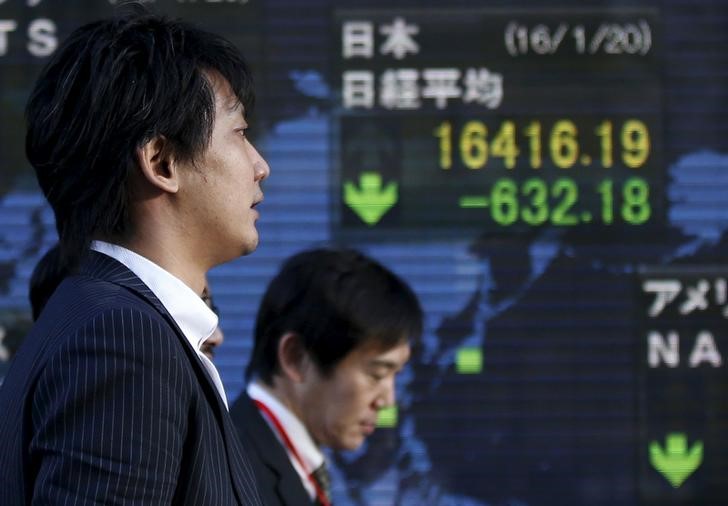By Lisa Twaronite
TOKYO (Reuters) - Asian shares got off to a rocky start on Monday after mixed U.S. jobs data helped sink shares on Wall Street, but trade was thin with many regional markets closed for the Lunar New Year holiday.
MSCI's broadest index of Asia-Pacific shares outside Japan (MIAPJ0000PUS) was down 0.2 percent, with Australian shares (AXJO) slipping about the same amount.
Japan's Nikkei (N225) pared early steep losses, helped by a weaker yen, but it also was down 0.2 percent by midday.
"We didn't get much clues on future U.S. rate hikes from the jobs report, so investors are having hard times deciding their positions," said Takuya Takahashi, a strategist at Daiwa Securities.
"Japanese companies' earnings reports are not helping sentiment, either, so the market may stay sluggish for a while."
U.S. nonfarm payrolls increased by just 151,000 jobs last month, falling well short of expectations for a rise of 190,000.
But the unemployment rate fell to 4.9 percent, the lowest since February 2008, and wages rose, indicating some signs of underlying strength in the labour market despite the weak headline figure.
With Singapore, Hong Kong and mainland China all closed for the new year holiday, "volumes will be well below average and there tends to be a build-up of global leads that is released once Asian investors return to their desk – expect 'release valve trading late in the week," Evan Lucas, market strategist at IG in Melbourne, wrote in a note to clients.
Markets in China, a focus of recent market concern, will be closed for the entire week for the holiday.
Data released over the weekend showed China's foreign reserves fell for a third straight month in January, as the central bank dumped dollars to defend the yuan and prevent an increase in capital outflows.
Beijing has been struggling to underpin the yuan, which faces depreciation pressure as China's growth rate slows to its lowest levels in a quarter of a century.
"Just as China's persistent accumulation of foreign reserves in the first decade of the 21st century signalled that its managed currency was undervalued, its persistent loss of foreign reserves signals that the yuan has become overvalued by market criteria," economist Bill Adams at PNC Financial Services Group (N:PNC) said in a research note.
"There is a large probability that China's central bank tires of spending its foreign reserves to defend an overvalued currency in the near future. The People's Bank of China will likely widen the currency's trading bank and permit a larger managed slide against the dollar in coming months."
Also over the weekend, North Korea's launch of a long-range rocket drew international condemnation.
On Wall Street, major U.S. indexes logged both daily and weekly losses. The Nasdaq Composite (IXIC) led session losses, plunging 3.25 percent after a spate of disappointing forecasts from the technology sector.
Recently weak U.S. economic data has led investors to pare bets on a steady pace of interest rate increases by the Federal Reserve.
Speculators slashed bullish bets on the U.S. dollar for a sixth straight week through Feb. 2, as net longs fell to their lowest level since roughly the third week of October, according to Reuters calculations and data from the Commodity Futures Trading Commission released on Friday.
In currency markets, the dollar index (DXY), which tracks the greenback against a basket of six major rivals, edged up 0.1 percent to 97.131, well above a nadir of 96.259 plumbed last Thursday, its lowest since October.
The dollar rose about 0.4 percent to 117.26 yen <JPY=>, moving away from Friday's 2-1/2 week low of 116.285 in a week in which it logged a 3.6-percent slide, its biggest weekly drop since July 2009.
The euro edged down about 0.2 percent to $1.1135 <EUR=>, though it remained in sight of Friday's three-month high of $1.1250 scaled immediately after the headline figure of the payrolls data led investors to reduce their bets on further Fed rate hikes.
The Australian dollar <AUD=D4> added 0.3 percent to $0.7081 after plunging nearly 2 percent against its U.S. counterpart on Friday.
Crude oil futures edged higher, against a backdrop of hope for steps by oil producers to address the global supply glut that has led to recent steep selloffs.
Saudi Arabia's oil minister Ali al-Naimi discussed cooperation between OPEC members and other oil producers to stabilise the global oil market with his Venezuelan counterpart on Sunday, according to state news agency SPA.
But nothing was decided, so wariness kept gains in check. Brent crude (LCOc1) was up about 0.2 percent at $34.11 a barrel, while U.S. crude futures (CLc1) added about 0.2 percent to $30.94.
